In a filing with the SEC on Friday, Chipotle announced that a portion of future CEO compensation will be tied to the company's share price performance.
The move comes as health concerns have continued to plague the stock over the past year--it is now down 23%. According to the filing, shares will have to stay above $700 for 30 consecutive days in order to trigger new stock awards for executives.
The "Halftime Report" experts and guest host, Rich Pzena, debated the potential merits--and pitfalls--of tying CEO compensation to share price.

The desk is in agreement that such a policy can create negative incentives for CEOs. Rather than focus on metrics like growth and dividends, CEOs might instead exercise measures to artificially inflate stock price. While a higher price in the short term would benefit the individual, it might come at the expense of long term growth.
"I think it's well intentioned since there's been a tremendous amount of money lost in the stock," Josh Brown said of the burrito maker's plan.
But intention aside, Brown doesn't think it's a good idea. "I'm not sure it's so great because you set up a lot of perverse incentives when you try to get mangers focused on stock price," he said.
From a different standpoint, Steve Weiss believes such a policy is also bad for the CEO since "the one thing you can't predict is the market and stock price." While he believes that there are very few "bad actor" CEOs out there who would intentionally try to manipulate stock price, he thinks compensation should be determined by "operating metrics" alone.
"Halftime Report" guest host Rich Pzena perhaps summed up the current debate best, saying "the best way is to have them [CEOs]...own a significant chunk so you care about the long-term performance and it hurts if it is bad."



